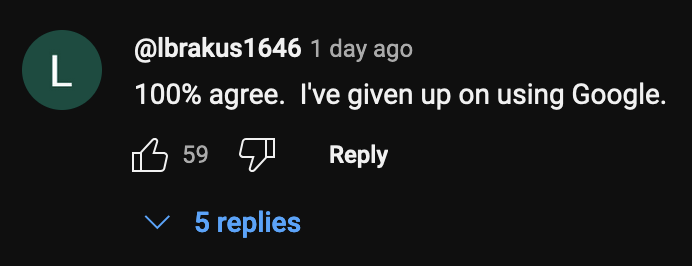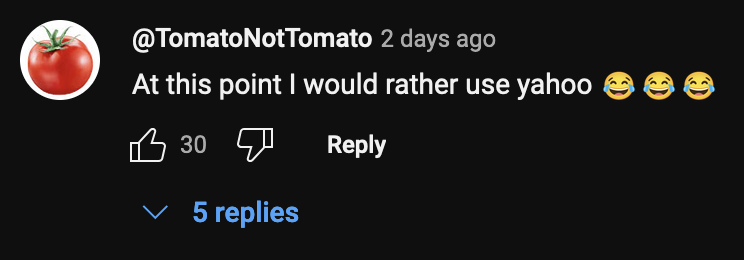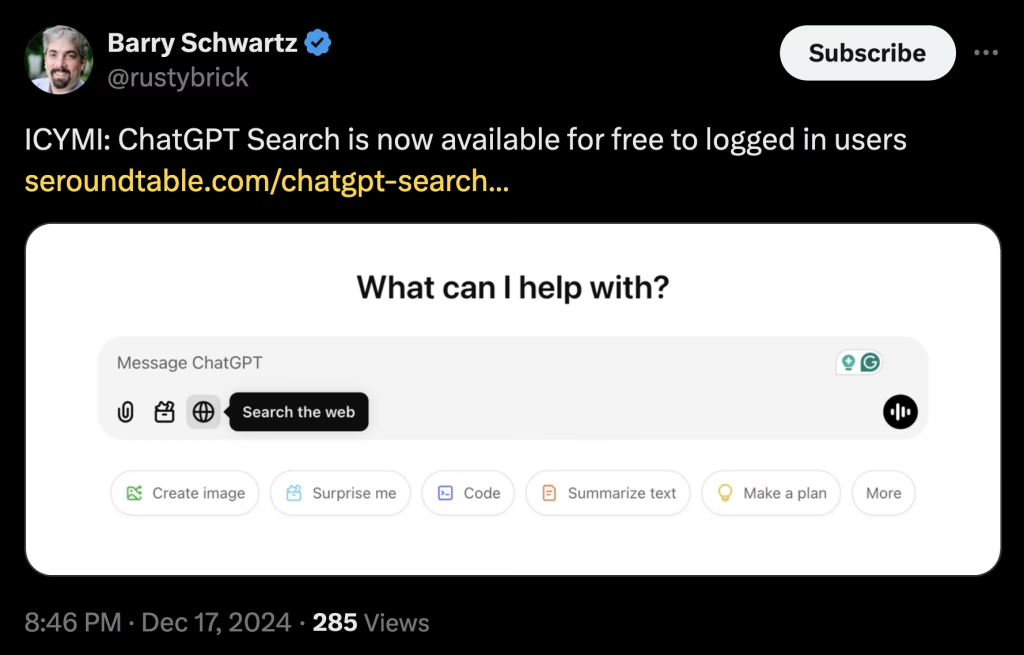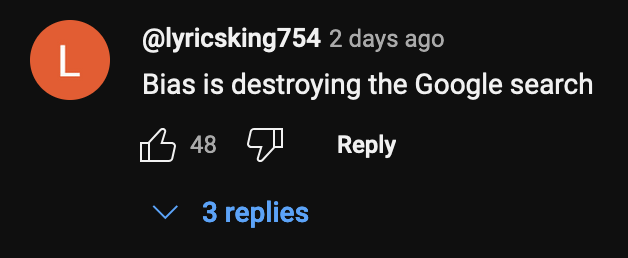
Google, the search engine that’s forgotten how to search
If you work in the SEO industry, you may be blinded by the lights. The noise can be deafening. You may trust most of Google’s official statements. Many in the search community blindly believe Google but I’m glad not everyone does.

I’ve been increasingly critical of Google Search in the past years but I’m not alone: many technically unsophisticated people using Google have also noticed the decreasing quality of organic results.
I’ll show you why ordinary people are unhappy with Google Search, Google Ads and YouTube Search, using their own words. I’ll explain where I found the less biased conversations. Senior people at Google have blocked me but I don’t have a personal vendetta against Google. It is actually quite the opposite. I used to love Google. I just hate the many dumb self-destructing mistakes the company keeps making. This is my warning for 2025.
Google Search in 2024-2025? The Worst of Times
Alphabet, Google’s parent company, is navigating one of the most perilous periods in its history. The primary issue? Artificial intelligence, right? No, the problem is natural stupidity. The danger isn’t AI, it is a disconnect between Google’s lack of vision and the quality expectations of its users. Not only is Google not improving, the quality of results is going down —fast!
But there’s more. Google secretly performed the greatest scrapping experience of all time. The end result is stolen content and stolen engagement, thanks to AI overviews. And there’s another problem impacting those who continue to publish content (content they know will be “stolen”). The directionless nature of Google’s Core Algorithm Updates has left many companies and web publishers relying on organic traffic wondering: “Is this really worth it?”
Google Search has decimated the livelihoods of numerous legitimate businesses worldwide that depended solely on organic traffic. If you ask me, Google has repeatedly set quality guidelines that it then fails to uphold itself. But let’s not focus on publishers. Let’s focus on users. The people who search. As you’ll see, publishers aren’t the only ones looking for alternatives. Users are also quickly turning to different platforms.
Finding the Less Biased User Sample
I wanted to look at the everyday experience of ordinary users. But I didn’t want to put words in their mouths so I went the easy way: I took screenshots of what people actually posted.
QUESTION: Where could I observe real users exchanging freely in their natural habitat?
X/Twitter has a dynamic SEO community but precisely because of this, the discussions would be biased. Most statements would be from relatively skilled individuals.
Linkedin is by far the most respectable social platform. There is a small but vibrant SEO community. I therefore faced the same problem and another “issue”: on LI people use their real identities! This seems great but it would lead to a bias because who wants to criticize companies publicly?
I’m not saying that the unspoken rule on Linkedin is that everybody must be happy and successful. But it certainly helps if that’s what they appear to be because publicly complaining does not look good in the eyes of potential future employers. Because professionals are aware, they often self-censor. I love Linkedin but I’ve observed a behavioral phenomenon I’ve named toxicity positivity. Therefore, I could not get my comments from this great business platform.
A possible alternative was a popular social discourse website that gets an unfair advantage in Google’s Organic Search but it was not the right choice either. Why? Because they have an unpaid workforce called “moderators” who agree to work for free in exchange of the ability to push their personal worldviews and arbitrarily ban comments that does not align with their ideologies. And there were other problems. Some moderators have used the unfair rankings this platform gets in Google’s SERPs to promote affiliate links. Those reasons prevented me from using them as a trustworthy and credible source.
So, where could I go to show you what everyday people around the world think about Google? I needed a global community with people connected 24/7. I needed to avoid the two problems of self-censorship and self-promotion because both would alter the quality of the conversation.
Google Search as Seen on YouTube
As surprising as it may seem, my final choice was YouTube. No SEO community. An incredible amount of people are watching videos. People speak their mind in the comment sections under those videos, in part because they can remain anonymous.
Sure, Google acquired YouTube in October, 2006 for US$1.65 billion (in stock). And sure, in 2025 YouTube will be one of Alphabet’s most important assets. Yes, YouTube did “censor” my parody video roasting Google’s CEO Sundar Pichai in 2024. After this short video was watched dozens of hours on Linkedin, I was asked to upload it to YouTube. I reluctantly did it. After it reached 200 views on YouTube in the first hours, the growth suddenly stopped and the counter didn’t move in the past 5 months. You can still find the video if you explicitly search for it but the promotion stopped. This process is called shadow banning.

You remain there, your content isn’t deleted but almost nobody can see you because the platform isn’t promoting you anymore. Did that happen because I made fun of Google by highlighting their strategic mistakes and their lack of vision in the past years? Those things are not good for business. My video was therefore “hidden”. It isn’t something they want to show to the companies advertising on YouTube.
And Google also removed my video from the top organic results. Initially, I ranked amongst the top 3 results in Google Search. Today, searching for “Google CEO Parody” will list many results but not my video. Please allow me to believe that this is because I what I said comically was in fact true 🙂
I have no hard feelings toward YouTube. I have no intention of becoming an influencer. But thanks to this experience, I now have first-hand experience of how mentioning Google’s mistakes can lead to a loss of visibility for creators. If you want to go viral, do not even think about it!
I then decided to experiment with YouTube comments. My unsurprising conclusion is that yes, algorithmic censorship happens but mostly when people use sensitive keywords. Constructive criticism in comments seems to be relatively well received on YT.
That’s why all the user screenshots I’ll share are people expressing themselves relatively freely on the YouTube video platform. I must admit I was surprised by how accurate many comments often were.
Google Search: Real User Feedback
Most people using Google to search might not be technically sophisticated users but they’ve noticed the same issues senior search geeks have complained about. Have a look.

Ordinary users noticed the quality of organic results going down. They’ve noticed how hard it has become to find useful and deep content without an ulterior commercial motives.

I’ve never been on Facebook so this one about the bad reputation of Google search and how people find workarounds surprised me.

Surely, this must be an isolated example. After all, Google still has by far the largest market share among search engines. Normal people would NOT stop using Google, right? Well…

Okay, this was one example. This does not prove anything, right?

Unknowingly, this user would rather use Bing Search than Google Search. Yahoo Search is a search engine owned and operated by Yahoo but it uses Bing, Microsoft’s search engine, to power its organic results. Yahoo simply could not keep up with Google.
This partnership with Microsoft means that when you perform a search on Yahoo, the organic results you see are provided by Bing’s search engine algorithms —and they rely on Bing’s index.
At this early stage, there seems to be a consensus: many users are fed up! This person respectfully notices that their Google searches seem less and less accurate lately.

Another “normal” user wisely remarks that Google seems to give more importance to newer, fresh content although this may involve quantity over quality.

This user is right and this led some publishers to artificially update the date of old articles. We’ve had content “repurposing” strategies created to update “old” content for a while now.
But there are problems at every level. Many of us look for local businesses on Google when we are on the move. The results are different than traditional results because we want to see the opening and closing hours, the ratings and of course, the location on Google Maps.
The search industry creatively named the process of optimizing for local searches “local SEO”.
How happy are Google users when they search for local or even national content? Here’s a resident of the United Kingdom who moved to a small city in the south-east of England.

Here is a different but EPIC Google search failure, this time happening in Australia. Clearly, both Natural Language Processing (NLP) and Google’s predictive analytics models designed to “guess” the user’s search intent could be better!

The issues go well beyond local search. There are accuracy problems, serious issues with AI-generated content and layout problems. But that’s not all because people who do not use ad blockers are completely fed up with the aggressive ads pushing down organic results.

Even if you’ve decided to ignore every ad displayed by Google, having to scroll down and having to make an intentional effort to identify actual organic results increases your cognitive load.
That’s because Google decided to blend ads into the organic search results.
But years ago, when you were searching, ads were displayed in the left side column. There was a clear distinction. So, what happened? Did Google become greedy and intentionally decide to make ads look like organic results to increase the number of clicks and therefore revenue?

Smart users have noticed that Google focuses on monetization and that the search engine has become careless. Who could deny that the quality has deteriorated?

I tend to agree that traffic is more concentrated than ever before and social and video platforms seem to be the winners. But it isn’t that simple and I’ll soon show you how unhappy YouTube users are with the quality of the results and the abusive ads.
Clearly, people are dissatisfied with Google’s organic search results. And you may have noticed a recent feature called “AI overviews”. If you wonder why this happened, allow me to explain.
Google scraped what content creators spent years creating and included it in their dataset to power their multi-modal large language model named Gemini. To simplify, Google stole the text, images and video content that humans created and used it to power their generative AI chatbot.
Months ago, when this was still named SGE within Google, I explained that the only way from preventing this from happening is to forbid access to your content to Googlebot.
This means you’re given two options: disappearing from Google Search or tacitly agreeing that your content will be used. You don’t know how. You don’t know when. But it will be used.
The AI answers you see in Google are generated by a special version of Gemini tailored for organic search. Google Search copied and improved what Microsoft did with Copilot, which is essentially a ChatGPT model tailored for Bing Search.
The result in both cases? Stolen human content, no added value created and, at times, dangerous answers that hopefully no one will trust blindly. This happens because Large Language Models often “hallucinate”. LLMs can generate completely inaccurate answers.
I was happy to see that everyday users have noticed the risks. Here’s a funny but potentially tragic example because you never know who will read this advice at the very top of Google.

And what about creativity? How long will content creators continue to publish new texts, images and videos if everything they create ends up being stolen by LLMs like Gemini and ChatGPT?

Even people who aren’t web publishers understand the implications. Some individuals and companies I speak to are about to stop playing the search engine game. Why spend time, money and creativity if everything you create ends up being scrapped and included in the dataset of giant companies?
Many web publishers have experienced a phenomenon called “zero-click” searches. People are searching, there are impressions but fewer clicks. The click-through rate is going down because Google has sucked the content of millions of sites to generate summaries instead of leading people to those websites. If you follow the money, it is obvious this is happening to increase the ad revenue.
OpenAI recently introduced ChatGPT Search, which relies on crawling, indexing and RAG (Retrieval-Augmented Generation). Initially, the live Search functionality was only available to paid subscribers. Today, anyone who logs into ChatGPT has access to the Search the Web button on ChatGPT.
Here’s Barry Schwartz covering the evolution of OpenAI’s strategy on December 17, 2024.

People are not only aware that a monetization strategy is coming, they are making fun of upcoming abusive practices. Again, users are not stupid and they know what data giants are up to!

The reality is that content theft and engagement theft are happening at a scale never seen before. So, why would humans continue to create content for free to power language models such as Chat GPT (OpenAI), Gemini (Google), Claude (Anthropic) or Llama (Meta AI open source models)?
The long-term “risk” is seeing highly creative humans going back to old-school approaches: printed texts, in-person concerts and real paintings. Of course your reach is limited offline but when your art is priceless, that might be the best option. High-quality content deserves to be appreciated by high-quality people, not stolen by machines for the profit of a minority.
I expect some creators will stop publishing online in the coming years if content theft continues to happen. But we are not there yet and most of us around the world still use Google Search. There are still more than 8 billion search queries on Google every day.
Remember that Google’s entire business model is built on advertising. Google Ads are worth a lot, mostly because they offer the highest bidder an opportunity to become more visible than high-quality organic results. Sure, there’s a difference between demand capture and demand creation. But still…

Take away high-quality organic results and the whole model will come crashing down. Who would pay to outrank terrible organic results? Nobody! And if the results are not qualitative, people will search for Google alternatives.

Users trust organic results more than ads. Many are smart. They know that with ads, you pay to become visible and you disappear when you stop paying. They know that with organic results, you have to deserve your ranking. At this that’s the official theory (in practice, things are different). And now, let me show you what users think of Google Ads.
Here, a user rightfully complains about ads sold on top of low-quality organic results.

Some users are actively trying to understand what is going on. They are suspicious because they feel Google might be manipulating the “search strings” to make it more ad-friendly.

YouTube is the most popular video platform and remember: it is owned by Google. Different types of bad practices are leading to frustration. We notice it when platforms try to keep us engaged for as long as possible. Again, many users are smarter than Google thinks.

YouTube users have noticed the significant decrease in search results to the point that by comparison, Google Search still looks good. But something has made YouTube “unusable” for some queries.

And that’s not all. People hate aggressive YouTube ads. Understandable.

Some have even noticed content in YouTube Shorts ads that I won’t even mention.

In my opinion, this comment sums up Google Ads perfectly.

Keep in mind that Google has decades of experience when it comes to organic search. Their machine learning solutions are among the best in the world. They hire highly paid engineers worldwide. Most are smart. So what is going on? A lack of strategic vision, no real leader and prioritizing shareholders at the expense of users. When companies disrespect their clients/customers/users, History teaches us things do not end well.

Inspired by the lyrics of this king, I now feel the urge to write my own Google song. My fear? That Google will steal my music and launch a musical AI model to replicate common patterns found in popular songs.

This article is a heads-up for Google employees who read my content. I’m telling you, do better in 2025. We still use “Google” to mean “search”. It would be sad if Google’s own mistakes hurt it more than any other competitor could…
© Elie Berreby (dear Google, I know you will but please don’t steal my stuff) • Linkedin • X • YouTube
IMPORTANT UPDATE: this article about the quality decrease of Google Search got SHADOW-BANNED by search engines as soon as it became “viral” on December 18, 2024 and until January 4, 2025. What suddenly changed at the start of January 2025? I published a 10,200+ word case study about what followed the Hacker News publication. And in less than 48 hours after I published this new article, many things changed! Some who rightly said it was “too long” also told others it was an “exceptional article”. I’ll let you be the judge: Search engines think I plagiarized my own content! My Hacker News Case Study

4 Comments
J
December 18, 2024Nightshade. It’s free software that everyone needs to be running their images through before posting them. It will poison the database and render it useless if enough people use it; at the very least, it will keep your own images from being effectively used after being scraped.
Elie Berreby
December 18, 2024Thank you for this comment, J! I was not aware of this data poisoning tool. Apparently, it allows artists and content creators to fight back against generative AI… I’ll have to investigate! 🙂
Search Engines Think I Plagiarized My Own Content! My Hacker News Case Study
January 2, 2025[…] all started on December 18, 2024 after I shared one of my articles entitled Google, the search engine that’s forgotten how to search on Hacker News. This was my first time on HN. My article got 100+ comments in a few hours and the […]
AI Answers Over Search: Is Google Digging Its Own Grave? | SEM King
February 25, 2025[…] I warned Google many times: check my article Google, the search engine that’s forgotten how to search (this time with user feedback from YouTub… […]